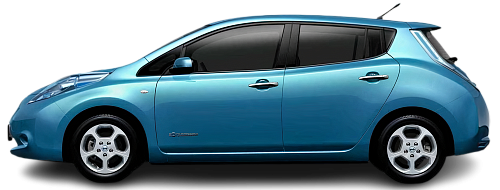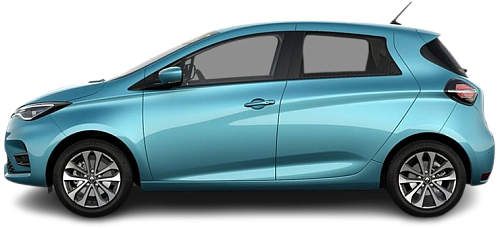Global EV Comparison: Nissan Leaf 30 kWh vs Renault Zoe Z.E. 40 R110
Struggling to Decide? Let AI Help!
Your AI Summary Is Ready!
General Info
Since both vehicles have been discontinued, they are now only available on the used car market. You can get the Nissan Leaf 30 kWh (2015-2018) for as low as €7000, while the Renault Zoe Z.E. 40 R110 (2018-2022) begins at €7800.
The two vehicles share the same body style: Hatchback.
| Property | Nissan Leaf 30 kWh | Renault Zoe Z.E. 40 R110 |
|---|---|---|
| Years of Production | 2015-2018 | 2018-2022 |
| Current Status | Discontinued | Discontinued |
| Country of Manufacture | Japan, UK, USA | France |
| Body Style | Hatchback | Hatchback |
| Market Availability | EU, USA | EU |
| Price Europe (Used) | €7000 | €7800 |
| GCC Score | 4.3 | 5.2 |
Range and Efficiency
The Renault Zoe Z.E. 40 R110 (2018-2022) boasts a greater real-world range, a larger battery, and superior energy efficiency compared to the Nissan Leaf 30 kWh (2015-2018).
| Property | Nissan Leaf 30 kWh | Renault Zoe Z.E. 40 R110 |
|---|---|---|
| Range (EPA) | 172 km | - Range (EPA) |
| Range (WLTP) | - Range (WLTP) | 313 km |
| Range (GCC) | 175 km | 266 km |
| Battery Capacity (Nominal) | 30 kWh | 44.1 kWh |
| Battery Capacity (Usable) | 28 kWh | 41 kWh |
| Efficiency per 100 km | 16 kWh/100 km | 15.4 kWh/100 km |
| Efficiency per kWh | 6.25 km/kWh | 6.49 km/kWh |
| Range and Efficiency Score | 5.3 | 6.1 |
Charging
Both vehicles utilize a standard 400-volt architecture.
The Renault Zoe Z.E. 40 R110 (2018-2022) has no DC fast charging capability, whereas the Nissan Leaf 30 kWh (2015-2018) can charge at up to 50 kW.
The Renault Zoe Z.E. 40 R110 (2018-2022) features a more powerful on-board charger, supporting a maximum AC charging power of 22 kW, whereas the Nissan Leaf 30 kWh (2015-2018) is limited to 3.3 kW.
| Property | Nissan Leaf 30 kWh | Renault Zoe Z.E. 40 R110 |
|---|---|---|
| Max Charging Power (AC) | 3.3 kW | 22 kW |
| Max Charging Power (DC) | 50 kW | - Max Charging Power (DC) |
| Architecture | 400 V | 400 V |
| Charge Port | CHAdeMO | Type 2 (Mennekes) |
| Charging Score | 2.7 | 6.1 |
Performance
Both vehicles are front-wheel drive.
Both cars offer the same motor power, but the Renault Zoe Z.E. 40 R110 (2018-2022) achieves a faster 0-100 km/h time.
| Property | Nissan Leaf 30 kWh | Renault Zoe Z.E. 40 R110 |
|---|---|---|
| Drive Type | FWD | FWD |
| Motor Type | PMSM | EESM |
| Motor Power (kW) | 80 kW | 80 kW |
| Motor Power (hp) | 107 hp | 107 hp |
| Motor Torque | 254 Nm | 225 Nm |
| 0-100 km/h | 11.5 s | 11.4 s |
| Top Speed | 144 km/h | 135 km/h |
| Performance Score | 2.2 | 2 |
Dimensions
The Nissan Leaf 30 kWh (2015-2018) is longer, but has a similar width and height to the Renault Zoe Z.E. 40 R110 (2018-2022).
The Nissan Leaf 30 kWh (2015-2018) boasts a more extended wheelbase.
| Property | Nissan Leaf 30 kWh | Renault Zoe Z.E. 40 R110 |
|---|---|---|
| Length | 4445 mm | 4087 mm |
| Width (with Mirrors) | 1967 mm | 1945 mm |
| Width (w/o Mirrors) | 1770 mm | 1787 mm |
| Height | 1550 mm | 1562 mm |
| Wheelbase | 2700 mm | 2588 mm |
Cargo and Towing
The Nissan Leaf 30 kWh (2015-2018) features a larger trunk, but the Renault Zoe Z.E. 40 R110 (2018-2022) offers greater maximum cargo capacity when the rear seats are folded.
Neither car is equipped with a frunk (front trunk).
Neither vehicle is officially rated for towing in in the EU.
| Property | Nissan Leaf 30 kWh | Renault Zoe Z.E. 40 R110 |
|---|---|---|
| Number of Seats | 5 | 5 |
| Curb Weight | 1498 kg | 1502 kg |
| Cargo Volume (Trunk) | 370 l | 338 l |
| Cargo Volume (Max) | 720 l | 1225 l |
| Cargo Volume (Frunk) | - Cargo Volume (Frunk) | - Cargo Volume (Frunk) |
| Towing Capacity | - Towing Capacity | - Towing Capacity |
| Cargo and Towing Score | 4.6 | 4.2 |




